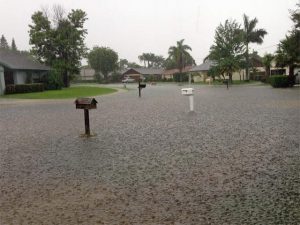Pending FEMA report’s warning

Neighborhood flooding in Indian River County, Florida
A FEMA advisory board is recommending that past flood damage and future risk be disclosed during the sale of a home. It noted Florida as one of 21 states that don’t require sellers to specifically disclose the property’s flood history. But even in the 29 states that do have such a requirement, the board found the disclosure “is often extremely deficient” and lacking “valuable information” about a property.
Those conclusions and recommendation will be in the upcoming 2020 Annual Report by FEMA’s Technical Mapping Advisory Council, which is made up of national flood experts that are advising FEMA on its flood mapping program. The group met during a series of late January videoconferences to approve final report language. Their goal is to urge information be provided necessary for new homeowners to proactively decide whether to buy flood insurance.
Although current Florida law requires sellers and their real estate agents disclose known defects or anything that “materially affects” a property’s value, the report notes that specific flood disclosure is not required in Florida and other flood-prone states. The Florida Realtors® has created a voluntary flood disclosure form and the National Association of Realtors has this 50-state summary of disclosures.
A bill filed in the Florida Legislature last year (SB 1842) would have required home sellers to specifically disclose any past flooding and insurance claims, past FEMA or other federal assistance, and present flood insurance coverage. The bill failed to receive a hearing and there is no similar bill yet filed in the 2021 session. We certainly know of cases where someone bought not knowing they were in a flood plain or had suffered previous flooding. To the FEMA report’s point, it is a “buyers beware scenario.”
But as we’ve said before, the piece that’s missing is that insurance agents are not required to talk about flood insurance with their customers. Regardless of a home’s past experience or future flood propensity, insurance agents have a responsibility to talk about flood insurance with customers at the time of initial property insurance policy issuance and on every renewal. A handful of agents do, but for those that don’t? The results are disastrous – yet Florida’s law is silent when it comes to mandatory insurance agent documentation of a conversation with its customers. What do you think? We’d love to hear from you.
Meanwhile, we’re still waiting for FEMA to release the new pricing associated with its National Flood Insurance Program (NFIP) Risk Rating 2.0, scheduled to take effect on October 1. That’s the major overhaul in federal flood insurance rates that are supposed to be based more on advanced modeling and less on the old FIRM maps. FEMA has said some NFIP policy premiums will go down, but many are expected to go up. Commercial landlords and tenants are being advised to review their leases and be prepared for increased flood insurance premiums. Likewise, owners of both commercial and residential property should be prepared for lenders to require flood insurance for properties having increased flood risks resulting from Risk Rating 2.0.
LMA Newsletter of 2-8-21

